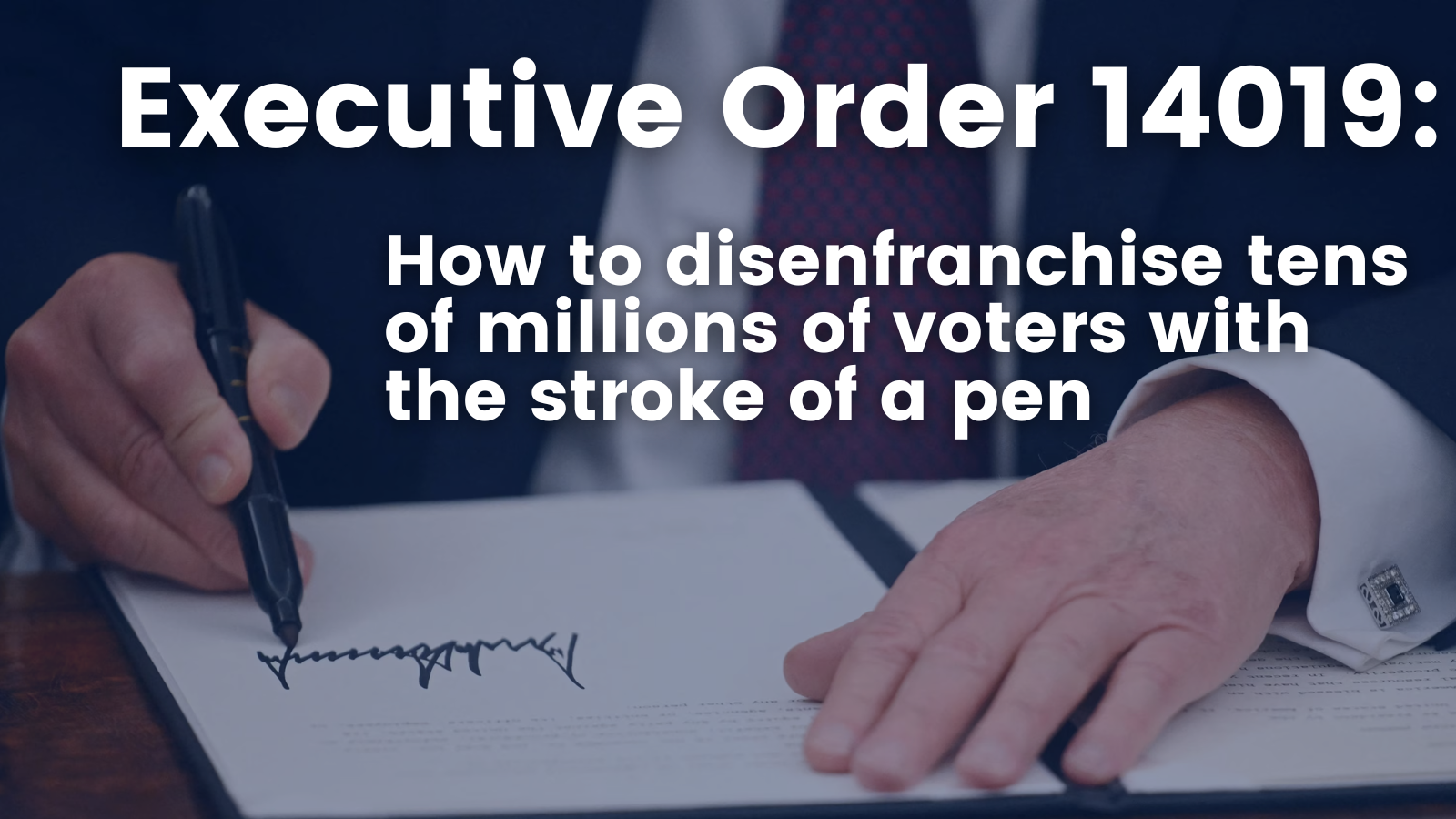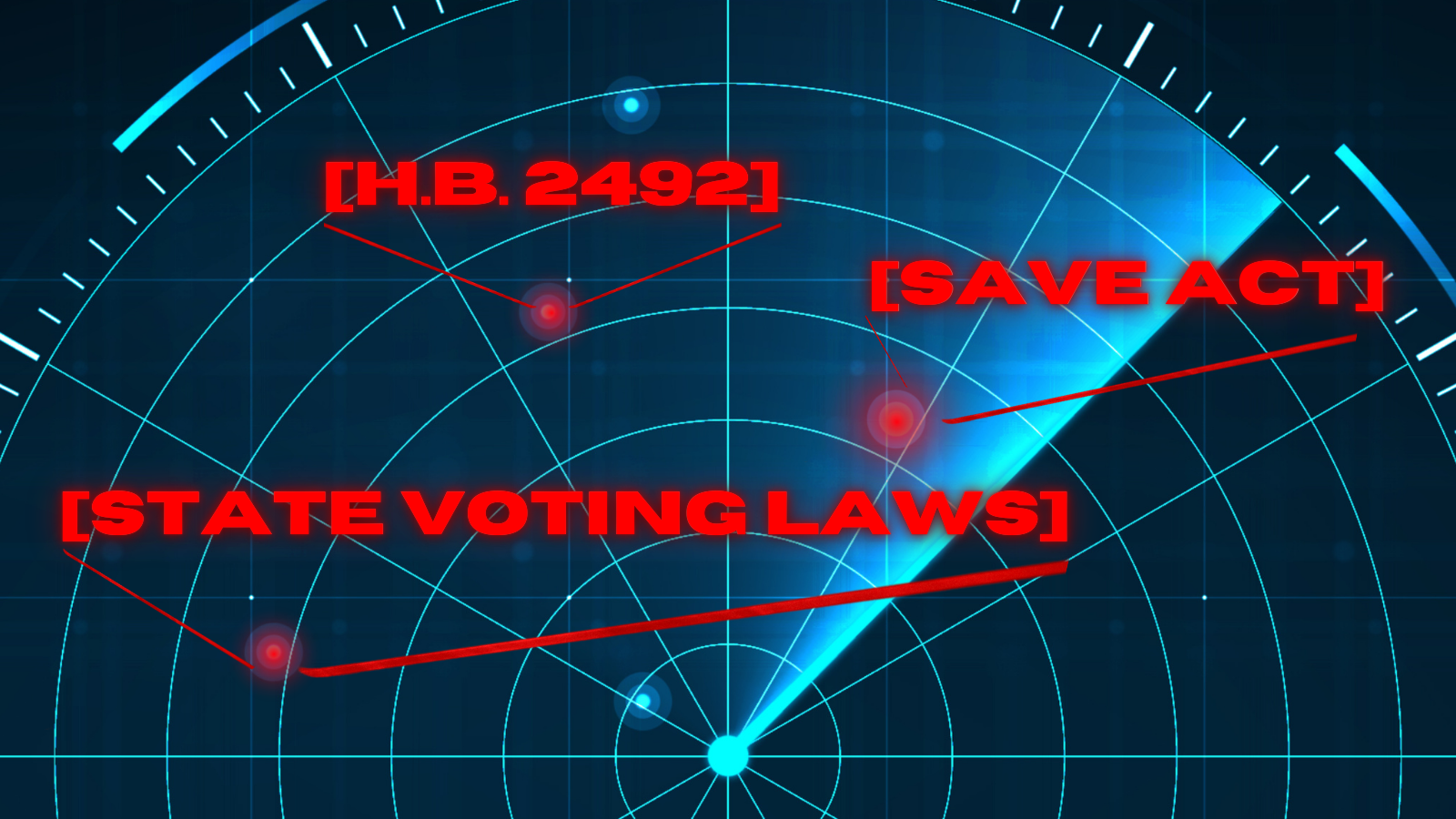President Trump Issues Legally-Questionable Executive Order to Dramatically Change Federal Elections, While Inaccurately Describing Law on Lobbying by Nonprofits with Federal Funds
On March 25, President Donald Trump issued an Executive Order (EO) seeking to make changes to the way federal elections are administered. Key parts of this EO are of highly questionable legal basis, asserting authorities over Elections and the Election Assistance Commission that legal experts note the President does not have. The EO will certainly be challenged in court.
Documentary Proof of Citizenship to Register Using Federal Forms:
Instructs the Election Assistance Commission (EAC) to modify federal voter registration forms to require “documentary proof of United States citizenship” as part of the voter registration process for federal elections. Election officials are instructed to note what type of documentation was provided on the modified forms. While the EO lists a variety of documents, only two exist in practice for most Americans: a passport, or a state driver’s license in conjunction with other “proof of citizenship,” which presumably would include a birth certificate or naturalization papers, though that is not spelled out in the EO. The EO also lists:
- A REAL ID “that indicates that the applicant is a U.S. citizen,” but legally-present non-citizens can also get REAL IDs, and the ID itself does not indicate citizenship.
- Military ID “that indicates that the applicant is a U.S. citizen.” However, non-citizens can serve in the military, so like the REAL ID, it is not proof of citizenship by itself.
- A “valid federal or state government-issued photo ID that… indicates that the applicant is a U.S. citizen.” There are only 5 states on the Canadian border that offer an Enhanced DL, for an additional fee, that might serve this purpose. Because of the additional fee involved, only some residents of those 5 states are likely to have one.
In the end, most Americans would need to produce either a passport, or a state drivers license along with other “proof of citizenship.”
Non-citizens are already barred from voting in federal elections and actual instances of non-citizen voting are vanishingly rare. Federal registration forms currently include an affirmation of citizenship, violation of which is punishable. The additional “documentary proof of United States citizenship” under the EO, as well as the similarly-crafted SAVE Act currently pending before Congress, could prevent tens of millions of otherwise eligible citizens from voting, including 21 million Americans who do not have such documents readily available. Additionally, upwards of 69 million married women who have taken their spouses name would face additional hurdles in using birth certificates that no longer reflect their current legal name.
Additional Election-Related Measures in the Executive Order:
- Requires certain agencies to share data with state election administrators to help them purge ineligible voters – including people who have died or moved out of state – from their voter registration lists. However, federal data on citizenship is spotty and incomplete.
- Directs the U.S. Department of Justice to coordinate with state elections officials to prioritize prosecution of election crimes, including election fraud.
- Bars states from accepting mail-in absentee ballots after Election Day, upending rules in many states that allow ballots to be counted as long as they are postmarked by Election Day.
- Prohibits non-citizens from accessing election equipment, ballots, or any other relevant materials used in the conduct of any Federal election.
- Directs the U.S. Department of Justice to prioritize enforcement of a federal law that makes it illegal for foreign nationals to make financial contributions to influence U.S. elections.
- Instructs the EAC to withhold Federal funding from states that don’t follow the rules set forth in the Executive Order. There’s currently no federal funds to withhold since the EAC has spent down its last Congressional allocation for distribution to states.
Provision Related to Nonprofit Lobbying:
- The Executive Order contains a factually inaccurate sentence that could create concern for many nonprofits: “The Attorney General shall likewise prioritize the enforcement of 31 U.S.C. 1352, which prohibits lobbying by organizations or entities that have received any Federal funds.”
- In fact, federal law does not prohibit nonprofits (or businesses) that receive federal grants, contracts, or cooperative agreements from lobbying.
- In 1995, a member of Congress tried to get that type of broad prohibition on lobbying enacted into law, but nonprofits were successful in advocating against it. Instead, the statute referenced in that sentence of President Trump’s recent Executive Order (often known as the Byrd Amendment) merely states that nonprofits and businesses that receive federal grants, contracts, or cooperative agreements may not use these federal funds to influence other federal funding decisions.
- Nothing in federal law prohibits federally-funded nonprofits from policy advocacy at the federal level or from using other revenue sources to lobby Congress or federal agencies for appropriations or for the awarding, renewal, extension, or amendment of a federal grant, contract, or cooperative agreement. President Trump’s Executive Order does not change this law.
The Executive Order is likely to be challenged in federal court.
Co-authored by Brian Miller, Executive Director, Nonprofit VOTE; and David Heinen, Vice President of Public Policy and Advocacy, NC Center for Nonprofits, and a past Board Chair of Nonprofit VOTE.
The Closely-Related SAVE Act:
A similar proof of citizenship to vote measure, the SAVE Act, is moving through Congress and could come to a House floor vote soon. Unlike the Executive Order, an act of Congress to require proof of citizenship to register to vote is far more likely to be upheld in court. Learn more about the SAVE Act and what you can do.




